
JACKIE ROBINSON
FOR FURTHER READING
Frommer, Harvey. New York City Baseball: 1947-1957. New York: Macmillan, 1980.
Recaptures the golden decade when the Giants, the Yankees, and the Dodgers were all home-based in New York City.
Begins with Jackie Robinson joining the Brooklyn Dodgers in 1947 and ends with the Dodgers and the Giants leaving the city for California at the end of the 1957 baseball season.
_____ . Rickey and Robinson. New York: Macmillan, 1982.
A double biography of the men who together broke baseball's color barrier. The book focuses on the lives of both men, their disparate beginnings, and the cause that bonded them in their adult lives.
Kahn, Roger. The Boys of Summer. New York: Harper & Row, 1972.
An evocation of the Brooklyn Dodger years and the lives and fortunes of some of the players in their after-baseball careers. One chapter, The Lion at Dusk, centers on Jackie Robinson.
Robinson, Jackie. I Never Had It Made. New York: Putnam, 1972.
Jackie Robinson's autobiography. His childhood in California, his army years, his baseball career, and the later period of his life when he was a spokesperson for the civil rights movement.

An imprint of Globe Pequot
Distributed by NATIONAL BOOK NETWORK
Copyright 1984 by Harvey Frommer
First Lyons Press paperback edition 2017
Photographs courtesy of:
UPI: pp. 15, 31, 46, 63, 70, 77, 82, 87, 92, 93, 99
The National Baseball Hall of Fame and Museum, Inc.: p. 96
All rights reserved. No part of this book may be reproduced in any form or by any electronic or mechanical means, including information storage and retrieval systems, without written permission from the publisher, except by a reviewer who may quote passages in a review.
British Library Cataloguing in Publication Information Available
Library of Congress Cataloging-in-Publication Data Available
ISBN 978-1-63076-157-8 (pbk.)
ISBN 978-1-63076-158-5 (e-book)
 The paper used in this publication meets the minimum requirements of American National Standard for Information SciencesPermanence of Paper for Printed Library Materials, ANSI/NISO Z39.48-1992.
The paper used in this publication meets the minimum requirements of American National Standard for Information SciencesPermanence of Paper for Printed Library Materials, ANSI/NISO Z39.48-1992.
FOR MY FAMILY
INTRODUCTION
When school was out, I sometimes went with my father in his taxi. One summer morning we were driving in East Flatbush down Snyder Avenue when he pointed out a dark red brick house with a high porch.
I think Jackie Robinson lives there, he said. He parked across the street and we got out of the cab, stood on the sidewalk, and looked at it.
Suddenly the front door opened. A black man in a short-sleeved shirt stepped out. I didnt believe it. Here we were on a quiet street on a summer morning. No one else was around. This man was not wearing the baggy, ice-cream-white uniform of the Brooklyn Dodgers that contrasted against his dark skin. He was dressed in regular clothes, coming out of a regular house in a regular Brooklyn neighborhood, a guy like anyone else, going out for a newspaper and a bottle of milk.
Then incredibly, he crossed the street and came right towards me. Seeing that unmistakable pigeon-toed walk, the rock of the shoulders and hips I had seen so many times on the baseball field, I had no doubt who it was.
Hi Jackie, Im one of your biggest fans, I said self-consciously. Do you think the Dodgers are gonna win the pennant this year?
His handsome face looked sternly down at me. Well try our best, he said.
Good luck, I said.
Thanks. He put his big hand out, and I took it. We shook hands, and I felt the strength and firmness of his grip.
I was a nervy kid, but I didnt ask for an autograph or think to prolong the conversation. I just watched as he walked away down the street.
From that long ago moment and from so many times seeing Jackie Robinson magnificently ply his trade at Ebbets Field, he was always my favorite baseball player. Driven, multi-talented, daring, he was the engine who powered the great Brooklyn Dodger team. This book, written many long years ago, was and will always be a tribute to him.
Harvey Frommer,
Lyme, N.H.
2017
THE EARLY YEARS
The California dusk was still an hour away when eight-year-old Jackie Robinson, following his mothers directions, took a broom and began sweeping the sidewalk in front of their house at 121 Pepper Street in Pasadena.
Nigger, nigger, nigger boy. The taunts of a young girl standing across the street broke the silence of the quiet afternoon. Jackie stopped his sweeping. He turned to face the white girl.
Youre nothing but a cracker, he shouted at her and began to move the broom with greater speed.
Soda crackers good to eat, the girl responded. Nigger's only good to beat!
The girl's father came out of the house. Why dont you and your family move the heck out of here! he shouted in an angry voice. You dont belong in a white neighborhood.
We do belong here, Jackie shouted back. We have as much right to live here as you do!"
The youths words only angered the man more. He began throwing rocks at the slim black youth. Jackie dodged a couple of the rocks, picked them up, and fired them back. One of them barely missed the man's head. The rock battle was brief. The mans wife came out and made him stop. What kind of a hero are you? she said to him. Stop throwing those things. How can you take part in a rock fight with a little boy?
Mallie Robinson, Jackies mother, had watched the entire episode from within her modest house. She was pleased with the behavior of her youngest child. He had stood his ground. He had fought back when he had to. She was proud that despite the hardships and the prejudice, her little family was solidly together.
She thought back to a time almost eight years before, when she had cradled the infant Jackie in her arms on the crowded Jim Crow train making the long trip from Cairo, Georgia, to California. The other childrenWilla Mae, Edgar, Frank, and Mackhad helped to carry the old suitcases and bags made of straw. Deserted by her husband, Jerry Robinson, Mallie realized that the new life the family was heading for would be obtained at a cost, especially on her part.
In Pasadena, Mallie had worked from dawn to dusk as a domestic. She had cut corners, saved some of the welfare money the family received, and had finally succeeded in moving herself and her children out of the crowded apartment that was their first California home to a little house.
The Robinsons survived a petition drive aimed at forcing them out of the house on Pepper Street. Mallie also rejected an offer to sell the house. And Jackie Robinson moved with his brothers and sister through the years of childhood, conscious of his mother leaving early in the morning to work for others, returning late with leftovers from the homes of the white families she worked for.
All the children were taught to look after each other. The arrangement worked well until Willa Mae began kindergarten at the Grover Cleveland School and Jackie was the only child left at home.
Mallie decided that the best plan would be for Jackie to go along to school with Willa Mae. Officials did not approve. If I stay home and take care of Jackie, Mallie argued, Ill have to go on relief. Itll be cheaper for Pasadena if you allow him to go along with Willa Mae and play outdoors while she's in class.


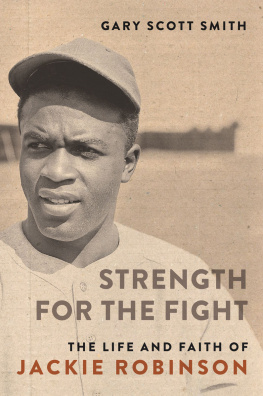
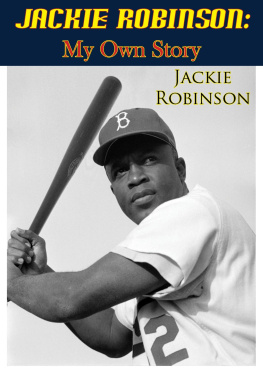
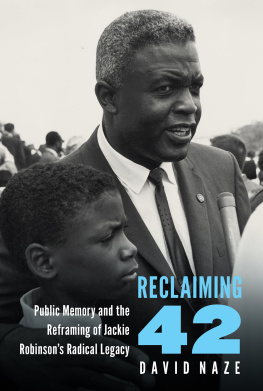
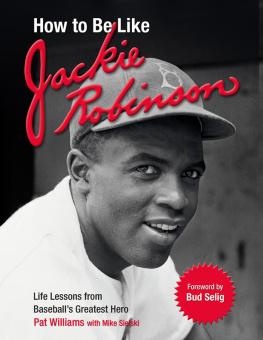
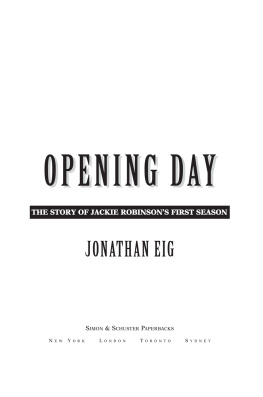
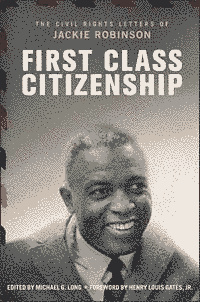


 The paper used in this publication meets the minimum requirements of American National Standard for Information SciencesPermanence of Paper for Printed Library Materials, ANSI/NISO Z39.48-1992.
The paper used in this publication meets the minimum requirements of American National Standard for Information SciencesPermanence of Paper for Printed Library Materials, ANSI/NISO Z39.48-1992.